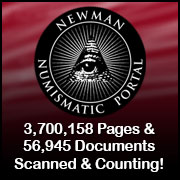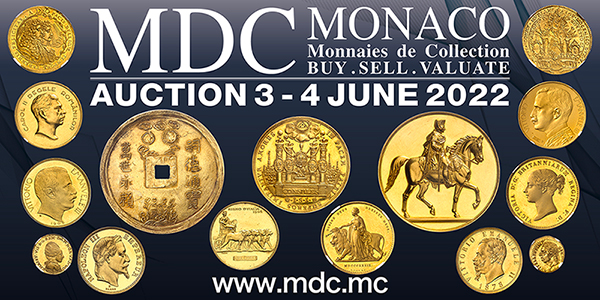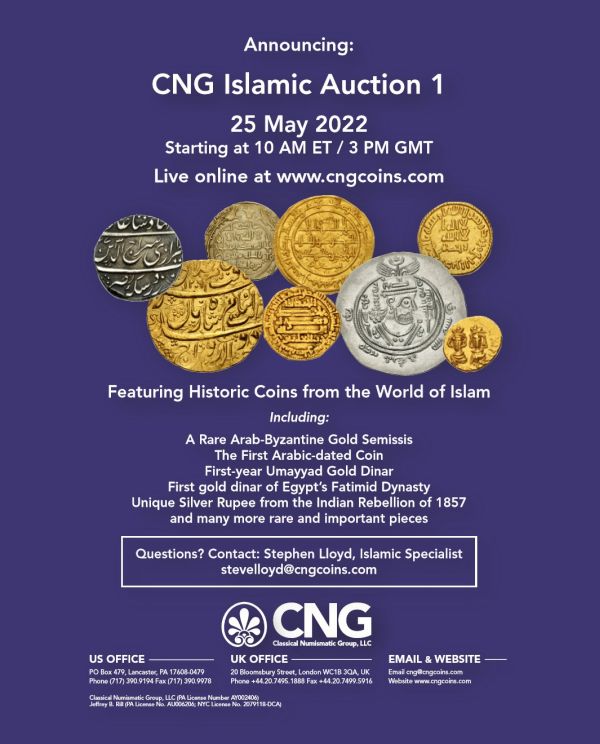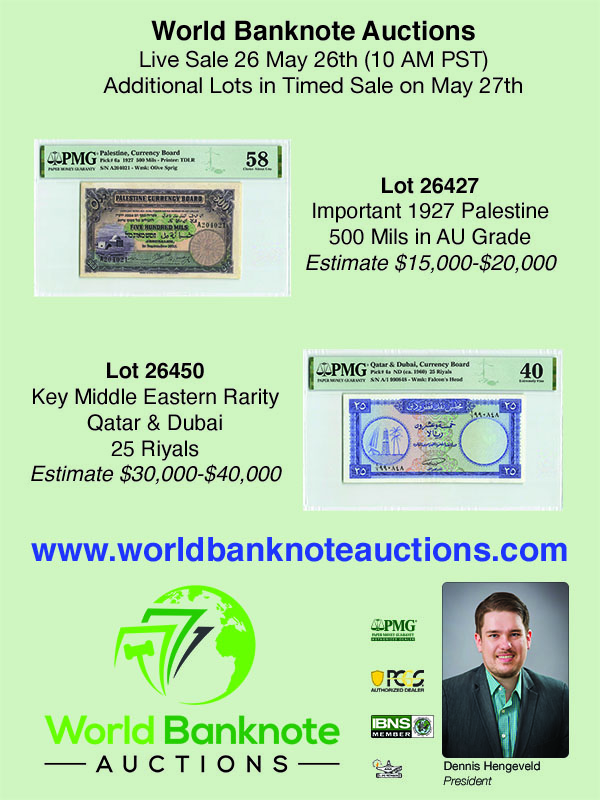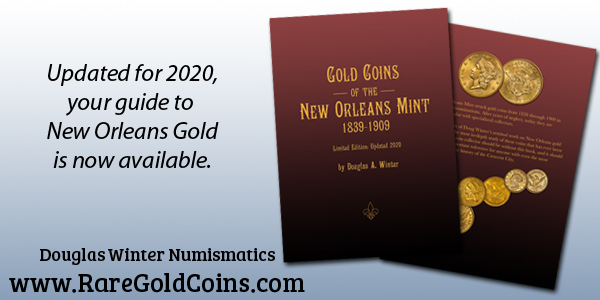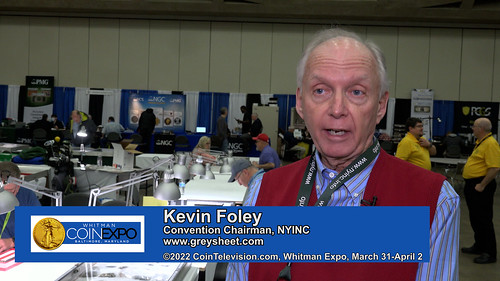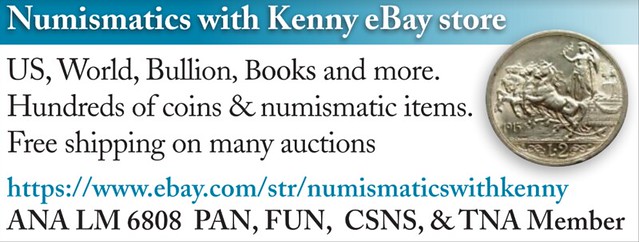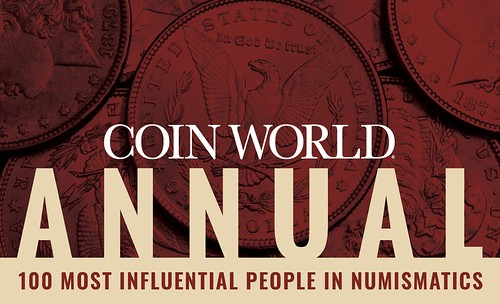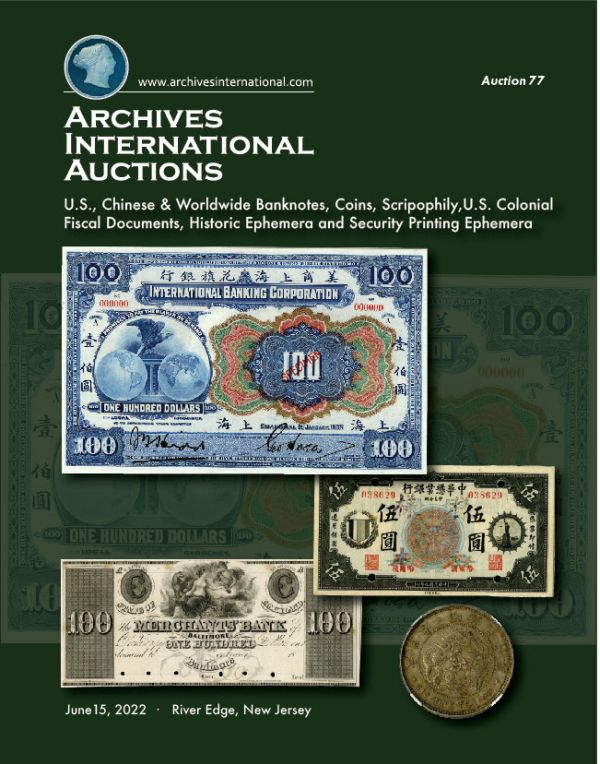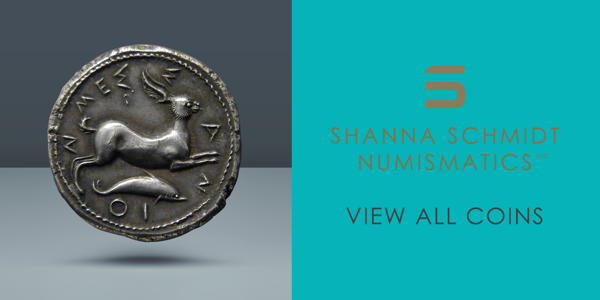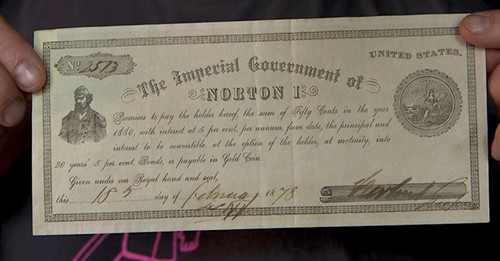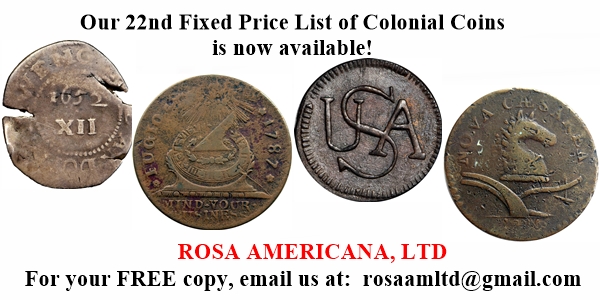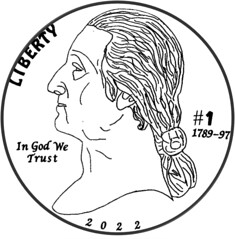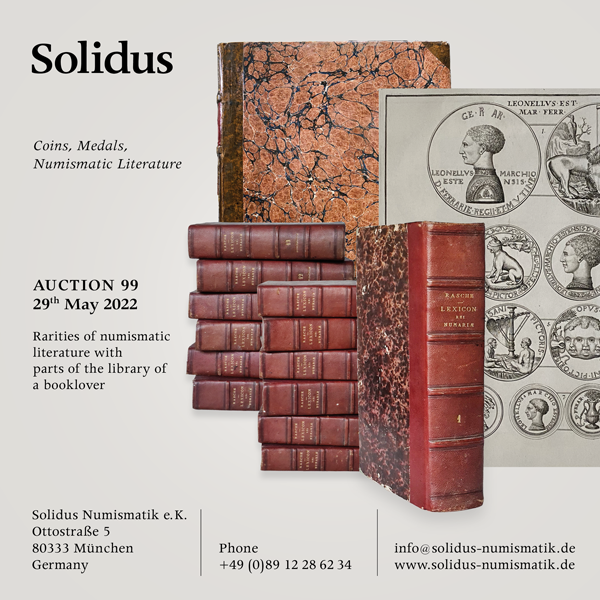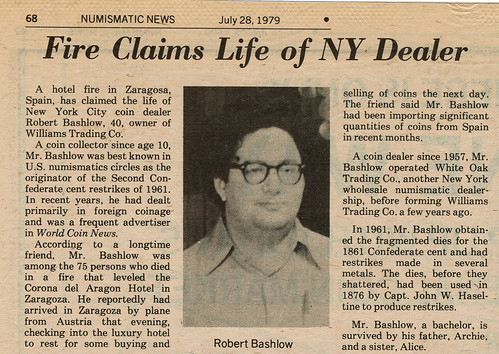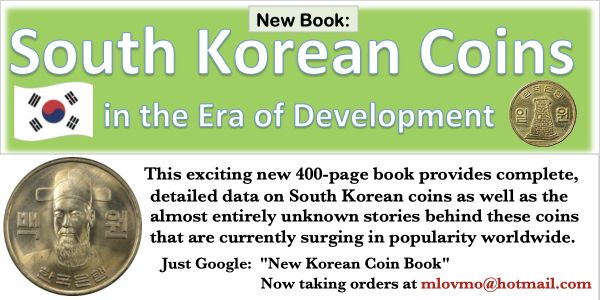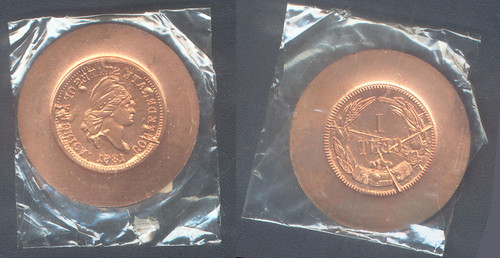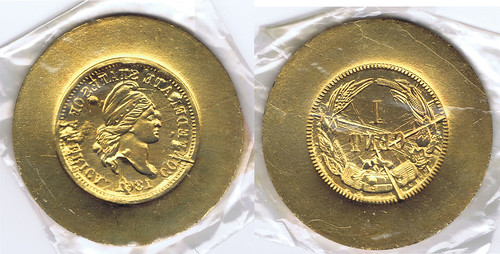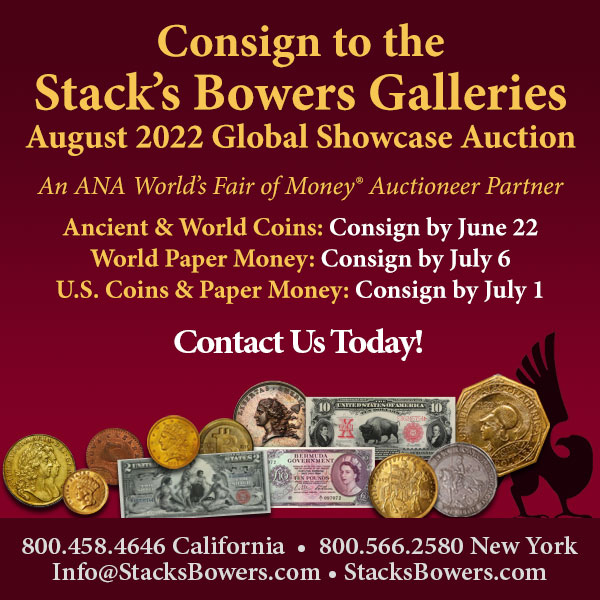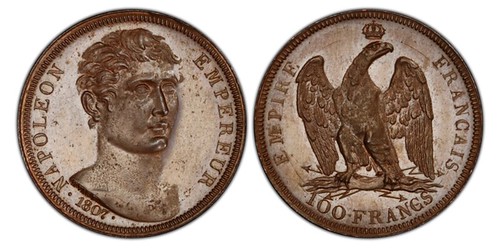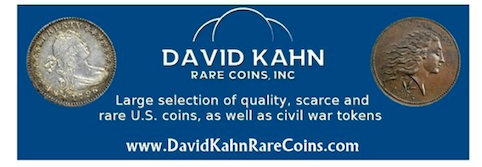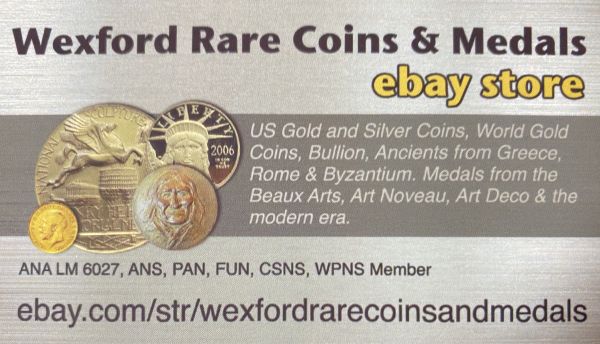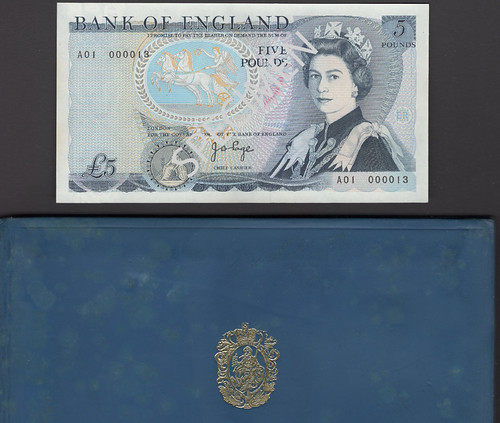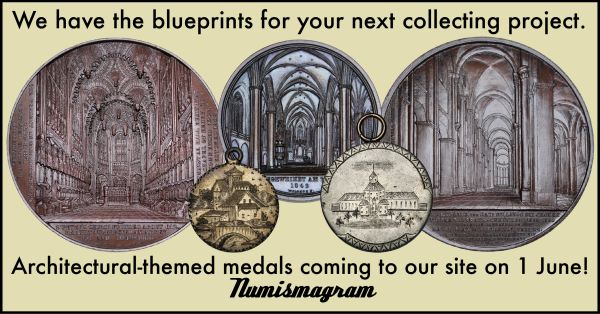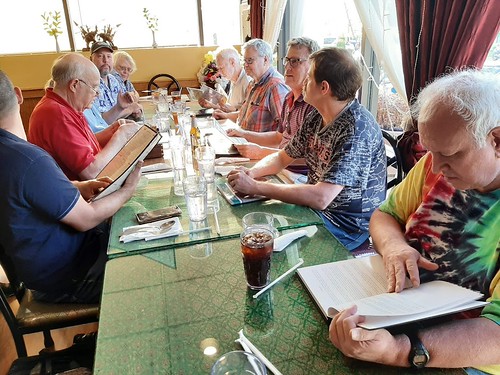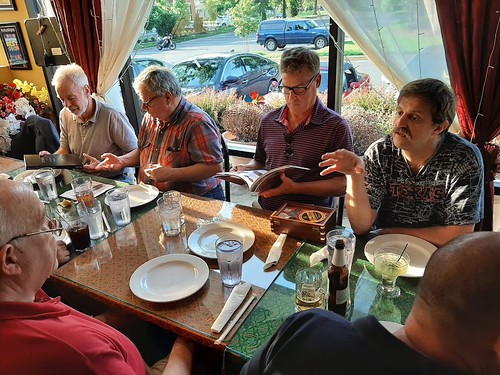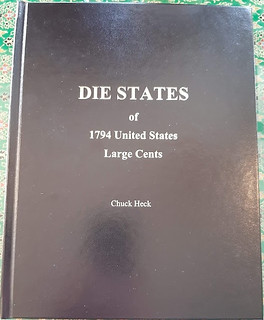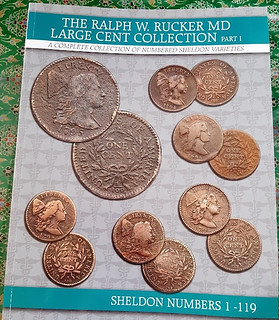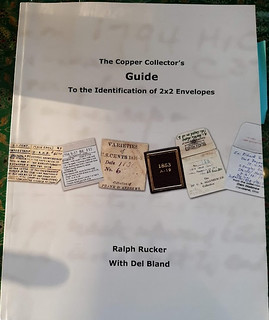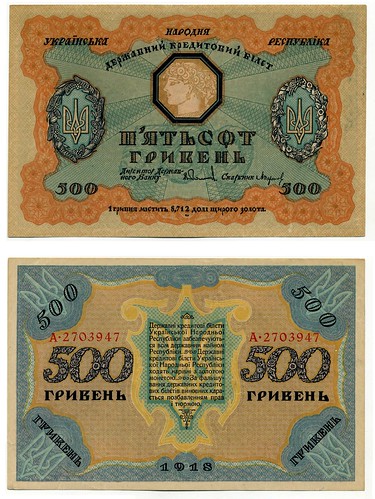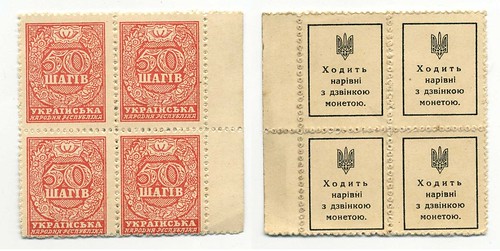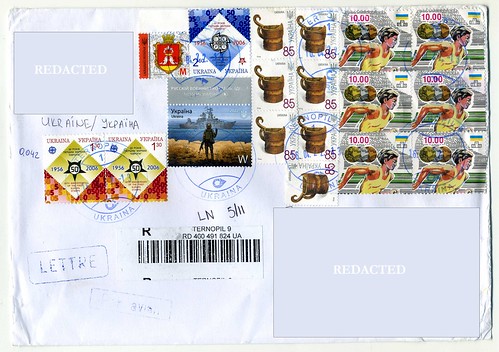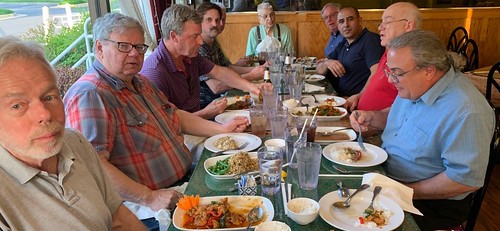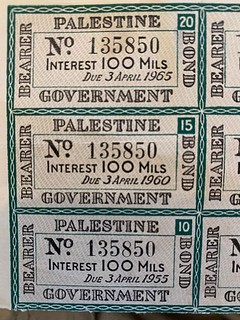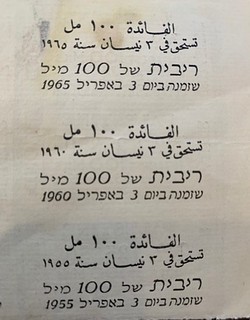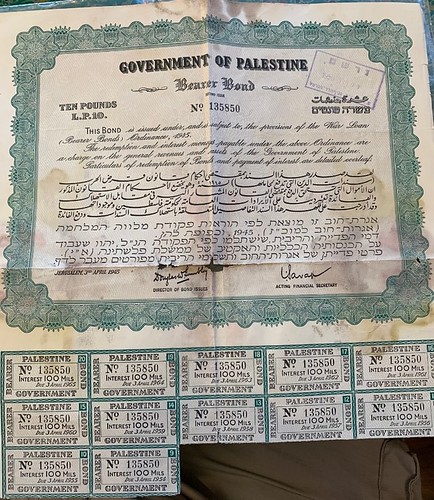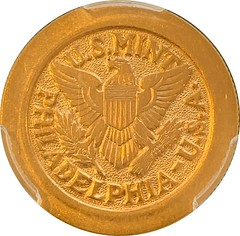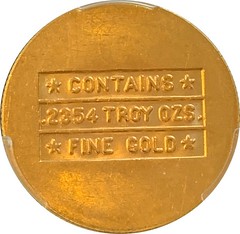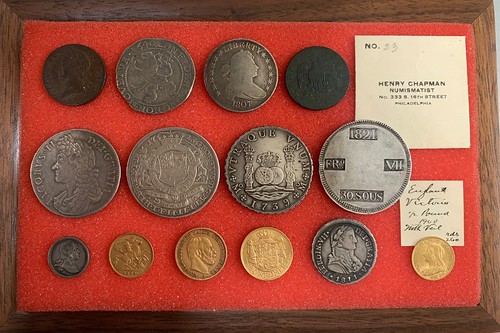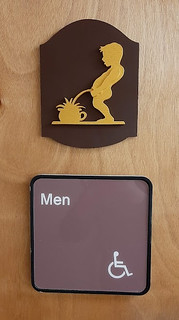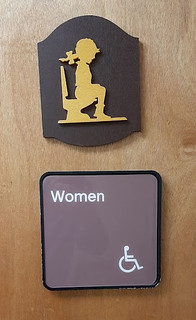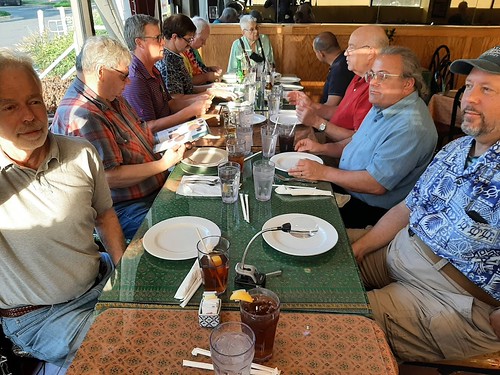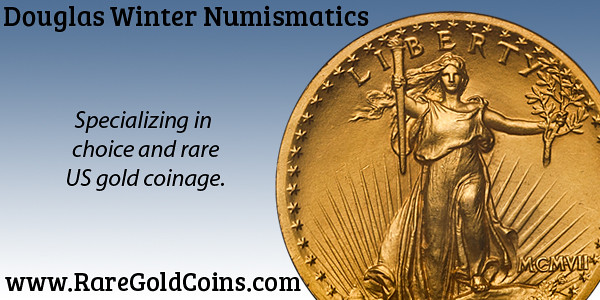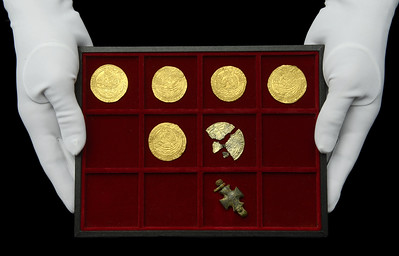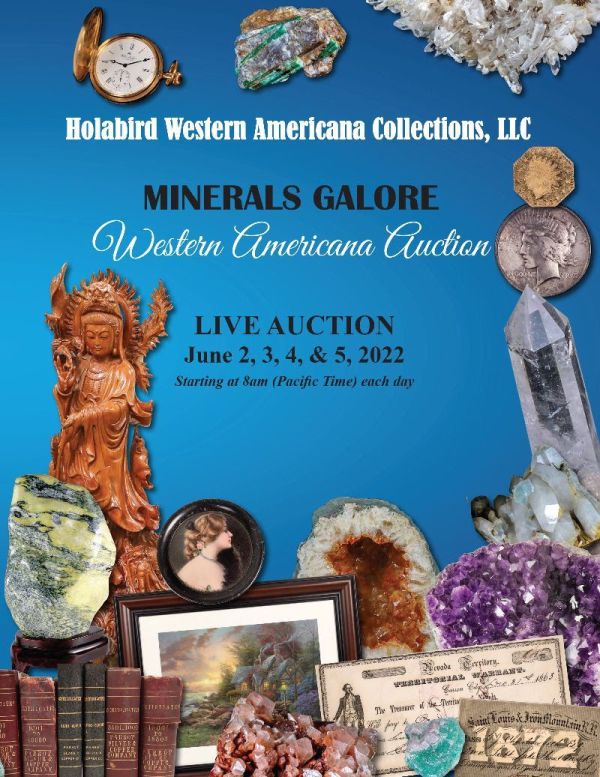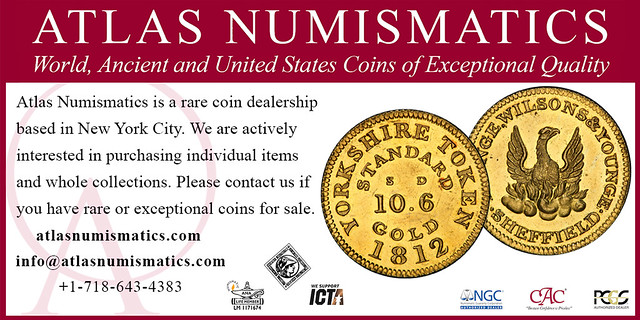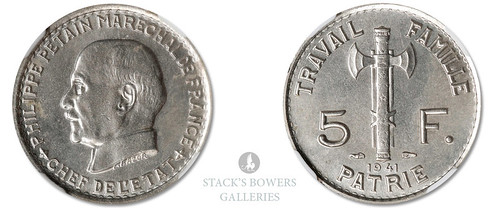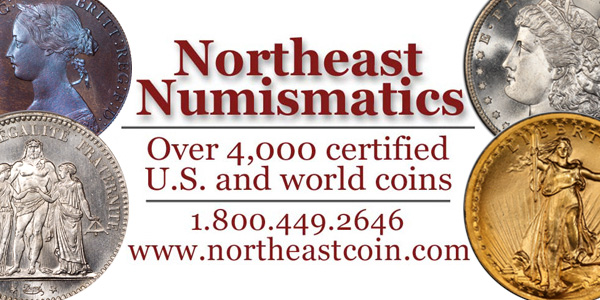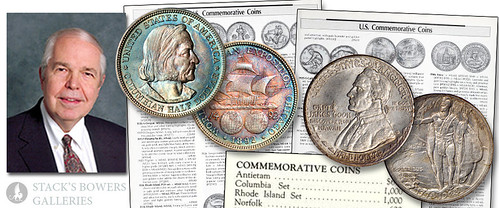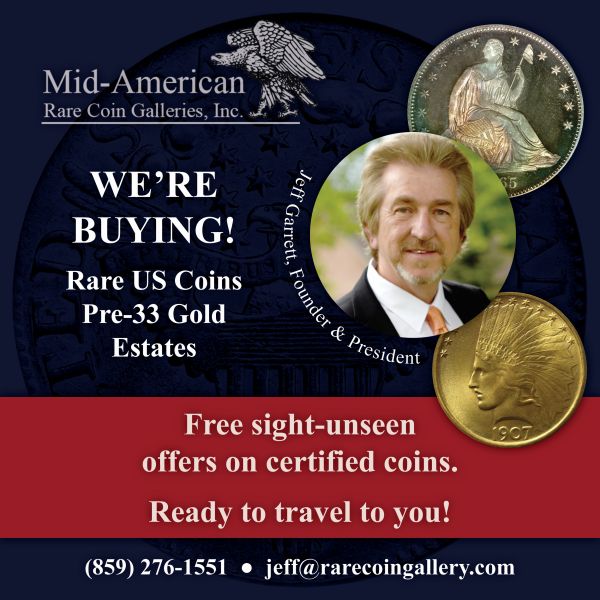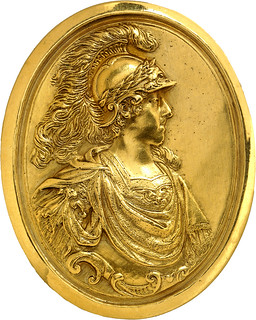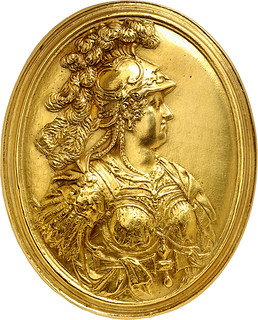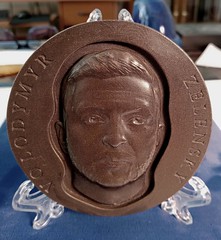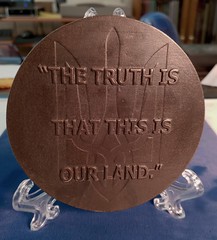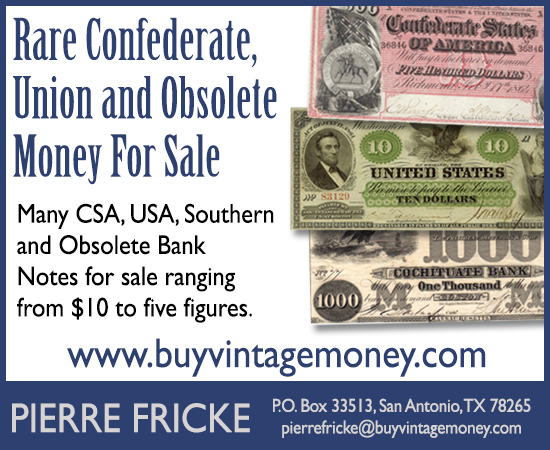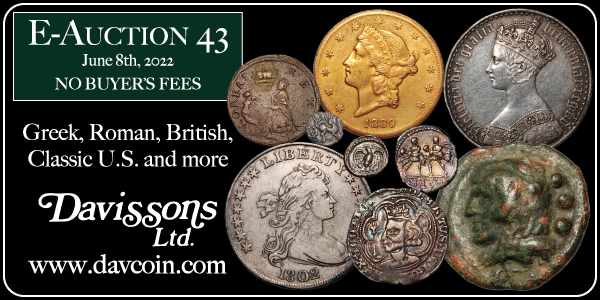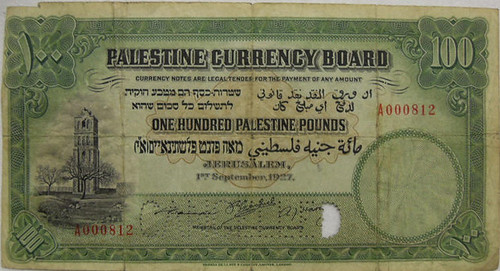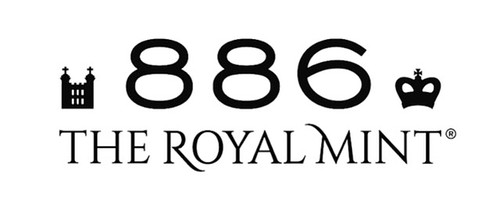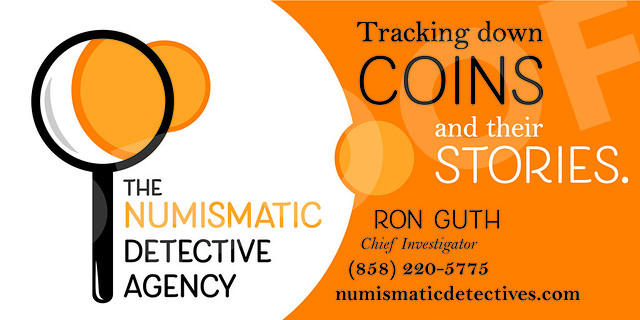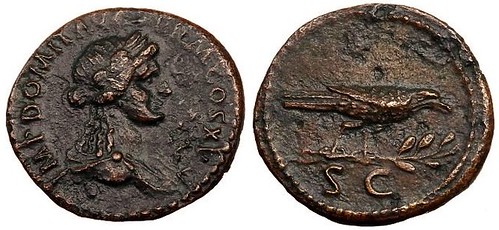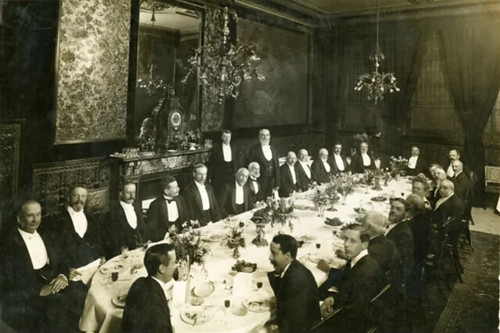
Visit our NBS Sponsors


About UsThe Numismatic Bibliomania Society is a non-profit association devoted to the study and enjoyment of numismatic literature. For more information please see our web site at coinbooks.org SubscriptionsThose wishing to become new E-Sylum subscribers (or wishing to Unsubscribe) can go to the following web page link MembershipThere is a membership application available on the web site Membership Application To join, print the application and return it with your check to the address printed on the application. Print/Digital membership is $40 to addresses in the U.S., and $60 elsewhere. A digital-only membership is available for $25. For those without web access, write to: Charles Heck, Treasurer AsylumFor Asylum mailing address changes and other membership questions, contact Chuck at this email address: treasurer@coinbooks.org SubmissionsTo submit items for publication in The E-Sylum, write to the Editor at this address: whomren@gmail.com BUY THE BOOK BEFORE THE COINSale CalendarWatch here for updates! |
- WAYNE'S WORDS: THE E-SYLUM MAY 22, 2022
- KOLBE & FANNING SYD MARTIN LIBRARY CATALOGS
- NEW BOOK: SCRIPTA MIRABILIA
- NNP ADDS DECORAH NUMISMATIC JOURNAL
- VIDEO: 2023 NEW YORK INTERNATIONAL
- COIN WORLD'S 2022 MOST INFLUENTIAL PEOPLE SURVEY
- MORE ON INSERT DIES
- NOTES FROM E-SYLUM READERS: MAY 22, 2022
- SAN FRANCISCO'S EMPEROR NORTON
- EXTENDING THE PRESIDENTIAL DOLLAR SERIES
- VOCABULARY TERM: INSTITUTE OF HERALDRY
- ROBERT BASHLOW, PART FOUR
- MORE BASHLOW PRODUCTIONS
- UPCOMING NUMISMATIC EVENTS: MAY 22, 2022
- CNG FEATURE AUCTION 120 RESULTS
- ATLAS NUMISMATICS MAY 2022 SELECTIONS
- NOONAN'S PLATINUM JUBILEE BANKNOTE AUCTION
- PLATINUM JUBILEE BANKNOTE AUCTION SELECTIONS
- WAYNE'S NUMISMATIC DIARY: MAY 22, 2022
- WAYNE'S NUMISMATIC DIARY: PAN SHOW MAY 2022
- 14TH CENTURY PURSE WITH FIVE GOLD COINS FOUND
- EIGHT REALES: THE FIRST INTERNATIONAL CURRENCY
- THE 1941 VICHY FRENCH 5 FRANCS
- COMMEMORATIVE MARKET RISE AND FALL, PART 2
- LOUIS XIII GOLD MEDALLION
- MORE ON THE ZELENSKY MEDAL
- KENTUCKY DERBY CENTENNIAL MEDAL
- DID SAN FRANCISCO BUY NORTON A NEW SUIT?
- THRIFT SHOP PALESTINE BANKNOTE FIND
- THE ROYAL CANADIAN MINT'S "ULTIMATE" COIN
- ROYAL MINT LAUNCHES LUXURY JEWELLERY LINE
- LOOSE CHANGE: MAY 22, 2022
- FEATURED WEB SITE: ROYAL NUMISMATIC SOCIETY
Click here to read the thin version on the web
Click here to subscribe
Click here to access the complete archive
To comment or submit articles, reply to whomren@gmail.com
Content presented in The E-Sylum is not necessarily researched or independently fact-checked, and views expressed do not necessarily represent those of the Numismatic Bibliomania Society.
WAYNE'S WORDS: THE E-SYLUM MAY 22, 2022
 New subscribers this week include:
Judy Blackman.
Welcome aboard!
New subscribers this week include:
Judy Blackman.
Welcome aboard!
Thank you for reading The E-Sylum. If you enjoy it, please send me the email addresses of friends you think may enjoy it as well and I'll send them a subscription. Contact me at whomren@gmail.com anytime regarding your subscription, or questions, comments or suggestions about our content.
This week we open with Syd Martin library sale catalogs, one new book, updates from the Newman Numismatic Portal, Coin World's Most Influential People survey, and more.
Other topics this week include insert dies, Emperor Norton, Presidential dollar design ideas, Heraldry, auction previews, Wayne's Numismatic Diaries, coin and banknote finds, the Kentucky Derby centennial medal, and the Royal Canadian Mint's "Ultimate" coin.
To learn more about the earliest coin found in Catalonia, the Decorah Numismatic Journal, the 2023 New York International, the death of Robert Bashlow, coins and the Colosseum, the Zodiac gold Mohur, the Florentine Academy of Fine Arts medal, die states of 1794 United States Large Cents, ARAMCO gold discs, Matt Tavory, the Zelensky medal and the Forger Wanted ad, read on. Have a great week, everyone!
Wayne Homren
Editor, The E-Sylum
KOLBE & FANNING SYD MARTIN LIBRARY CATALOGS
Hardcover and leatherbound editions of the Sydney F. Martin library sale are being offered by Kolbe & Fanning. -Editor
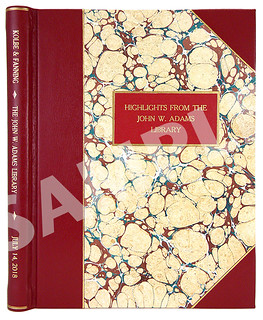 DELUXE LEATHERBOUND LIMITED EDITION OF THE NUMISMATIC LIBRARY OF SYDNEY F. MARTIN.; PRE-ORDER
DELUXE LEATHERBOUND LIMITED EDITION OF THE NUMISMATIC LIBRARY OF SYDNEY F. MARTIN.; PRE-ORDER
Gahanna: Kolbe & Fanning, April 30, 2022. 4to, half calf and marbled paper; cover label; gilt [Will be similar to image shown]; original pictorial covers bound in. 154 pages; 472 lots; profusely illustrated in color. PRL bound in. New. Item #6786
Price: $500.00
NEW BOOK: SCRIPTA MIRABILIA
Robert Hoge passed along the announcement for a new festschrift being published. Most of the articles are in Catalan or Spanish, with three pertaining to numismatics: two by prominent Catalan numismatists Miquel Crusafont i Sabater and Jaume Benages i Olivé (both written in Catalan), and one by Robert Hoge himself, featuring what is probably the earliest coin to have yet been found in Catalonia (in English). -Editor
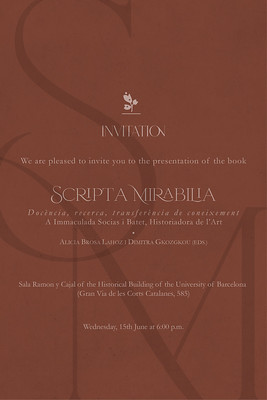 Please find attached your formal invitation to the celebratory event launching the publication of Scripta Mirabilia -- a compendium of homage to Dr. Maria Inmaculada Socias i Batet, Professor Emeritus of the Department of Art History, University of Barcelona.
Please find attached your formal invitation to the celebratory event launching the publication of Scripta Mirabilia -- a compendium of homage to Dr. Maria Inmaculada Socias i Batet, Professor Emeritus of the Department of Art History, University of Barcelona.
Time and Place: Sala Ramon y Cajal, Historical Building of the University of Barcelona, Gran Via de les Corts Catalanes, Wednesday, June 15, 2022, at 6:00 p.m. (CET).
This long-awaited tome of over 700 pages, put together as a labor of love by former students, features more than fifty submissions ranging from personal reminiscences and reflections to serious art-historical studies, offered by her many admirers, associates and fellow scholars in the wide variety of fields of activity, interest and achievement with which Dr. Socias has come to be known, ranging from Medieval, Renaissance and Baroque graphic works to archival and bibliographical investigations, architecture, decorative arts, collectors and collecting, numismatics and philatelics. It is a multi-lingual festschrift with a little something for almost all readers.
NNP ADDS DECORAH NUMISMATIC JOURNAL
The latest addition to the Newman Numismatic Portal is the Decorah Numismatic Journal. Project Coordinator Len Augsburger provided the following report. -Editor
VIDEO: 2023 NEW YORK INTERNATIONAL
These are selections from the David Lisot Video Library that feature news and personalities from the world of coin collecting. David has been attending coin conventions since 1972 and began videotaping in 1985. The Newman Numismatic Portal now lists all David's videos on their website at:
https://nnp.wustl.edu/library/multimediadetail/522852
Here's one on plans for the 2023 New York International show. -Editor
Kevin Foley Gives Update on New York International Numismatics Convention (NYINC) for 2023.
VIDEO: 5:32.
Kevin Foley, Convention Chairman,
David Lisot, Interviewer, CoinTelevision.com.
April 1, 2022.
The New York International Coin Convention is considered by many to be the premier coin show for international coin collecting in the United States. Based in New York City the convention attracts dealers from all over the world. General Chairman, Kevin Foley, talks about the Barclay Hotel where the convention is hosted as well as what collectors and dealers may expect at one of America's oldest international conventions.
David adds:
"What better time could be spent with world numismatics in the Big Apple? This convention brings out the elite players trading in ancients and foreign coins. A plethora of auction companies are present. If you are into world coins this event is a must."
An excerpt of the video is available for viewing on the Coin Television YouTube Channel at:
https://youtu.be/A5DQCzIC9mk
COIN WORLD'S 2022 MOST INFLUENTIAL PEOPLE SURVEY
Coin World has opened the 2022 version of its poll helping choose the year's "100 Most Influential People in Numismatics". The resulting article will be published in September as part of a Coin World Annual issue which will also include articles on "100 Top Companies" and "Young Numismatists". Here's the text from the survey's home page - follow the link below to cast your votes. -Editor
Rising to the uppermost echelons comes with unique responsibility for individuals reaching that peak. These individuals hold sway over the numismatic community. They not only influence but shape the industry's values, direction, audience, investments, choices, and decisions. At the same time, many are responsible for their brands or are experts within associations, corporations, and product development with data key to understanding. That understanding has become so incredibly valuable not just to those that enjoy coin collecting, but to the industry as a whole because it drives passion, audience and growth.
THE BOOK BAZARRE
MORE ON INSERT DIES
Heath White submitted these additional notes on Insert Dies. Thank you! -Editor
Here are examples of two dies showing what Dick Johnson called an 'Insert Die.' Both of these are from the Fraternal Supplies Company Archives and were used to produce top bars for different medals. The die with serial number 4298 is from M C Lilley and this serial number would date the die to 1922. The die with the 'Wayland Lodge 176' insert still in the die dates to the late 1880's and is most likely from Lilley, but could be from Frank Henderson (Kalamazoo, MI) or E A Armstrong (Detroit).
NOTES FROM E-SYLUM READERS: MAY 22, 2022
Pinches of London Dickeson Continental Dollar Restrikes
Jeff Shevlin writes:
"Tom DeLorey's comments on the Dickeson restrikes are correct. Mr. Bowers told me 15 years ago that he wasn't certain, but almost positive, that the 7,200 White Metal Dickeson restrikes were struck for his company Empire Coin Company by Pinches of London. Advertisements placed by Empire Coin when they were selling the Dickeson Restrikes stated they were struck from the original Dickeson dies."
Thanks for the confirmation. -Editor
To read the earlier E-Sylum article, see:
https://www.coinbooks.org/v25/esylum_v25n20a08.html : On Restrikes of the Dickeson Continental Dollar
(https://www.coinbooks.org/v25/esylum_v25n20a08.html)
Other topics this week include Kamberra Fantasy Banknotes, Belden's 1930 Philadelphia Mint Research, and the Other Continental Dollar. -Editor
SAN FRANCISCO'S EMPEROR NORTON
Levin Messick submitted some notes about San Francisco's Emperor Norton. Thanks. -Editor
EXTENDING THE PRESIDENTIAL DOLLAR SERIES
Reader Wayne Pearson thinks a lot about U.S. coin and paper money designs. Here are his latest out-of-the-box ideas for the Presidential dollar series. -Editor
When the state quarter program started, most people deciding to collect them had the reasonable expectation to live for those ten years.
When the presidential dollar coin program was conceived, it was obvious that no one would be able to complete the collection.
VOCABULARY TERM: INSTITUTE OF HERALDRY
Here's another entry from Dick Johnson's Encyclopedia of Coin and Medal Terminology. I added the Institute of Heraldry's coat of arms because, of course, they have one. -Editor
Institute of Heraldry. Medals, decorations, badges, insignia, seals of the United States Government – the official symbolic items for award, wear or display – are the responsibility of The Institute of Heraldry. Under the administration of the Department of the Army, the Institute furnishes heraldic services to all Armed Forces, other U.S. government organizations, and limited services to the general public.
ROBERT BASHLOW, PART FOUR
American Numismatic Biographies author Pete Smith submitted the fourth and final article of his series on Robert Bashlow, known in numismatics for, among other things, creating satirical medals and restrikes of the Confederate cent. Thanks! -Editor
MORE BASHLOW PRODUCTIONS
Steve from #1 Money Man submitted these notes and images of some Robert Bashlow productions. -Editor
To add to the multipart article on Bashlow, here are a few comments/pictures of items that were referred to.
UPCOMING NUMISMATIC EVENTS: MAY 22, 2022
Here are announcements of some current and upcoming numismatic events around the world.
- Numismatics Seminar: Greece After Rome, a free one-week course on coinage in medieval Greece
- Beyond Greece and Rome is a CoinWeek podcast on the ancient coinage of the Persians, Phoenicians and Carthaginians
- Coins and the Colosseum is a YouTube video of ANS Long Table presentation by Richard M. Beleson
- An Interview with John Kraljevich is a Coin World podcast
CNG FEATURE AUCTION 120 RESULTS
Here's the post-sale press release for Classical Numismatic Group's Auction 120, which closed May 11-12, 2022. -Editor
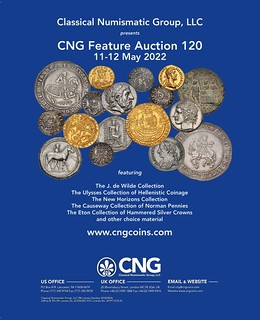 A gold
A gold Zodiac mohur
of the Mughal Indian ruler Jahangir reached $180,000, and three exceptional collections of English coins drew frenzied bidding, driving prices realized in Classical Numismatic Group's Feature Auction 120 to more than $4.8 million, more than double the presale estimate.
The auction, held as a live streaming event on
www.cngcoins.com on May 11-12, comprised more than 1,300 lots of ancient Greek, Central Asian, Roman, Byzantine, World and British coins, many of which attained several multiples of estimate. The market remains vibrant,
said Michael Gasvoda, Managing Director. The results from CNG 120, coming in at 200 percent of estimate, keeps us excited for the future of collecting.
ATLAS NUMISMATICS MAY 2022 SELECTIONS
Atlas Numismatics has updated their website with 153 new coins, medals, and tokens at fixed prices. Selections include the following items. Some beautiful pieces! -Editor
Napoleon Pattern 100 Francs
1067493 | FRANCE. Napoleon. (Emperor, 1804-1814). 1807 AE Pattern 100 Francs. PCGS SP65BN (Brown). By H. Vassalo. Edge: Plain. 11.94gm. • NAPOLEON EMPEREUR// 1807. Roman style bust to right, inscribed H.VAS.F on truncation / EMPIRE – FRANCAISE// 100 • FRANCS. Crown above eagle facing right. Mazard 601b; Bramsen 677 variant.
NOONAN'S PLATINUM JUBILEE BANKNOTE AUCTION
This Noonan's press release describes their upcoming May 31, 2022 Platinum Jubilee Banknote Auction. -Editor
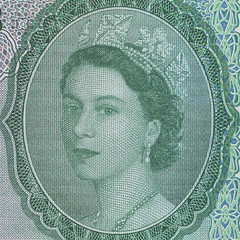 Mayfair-based Auctioneers Noonans, who specialise in coins, medals, banknotes and jewellery will be holding a 500-lot auction of Banknotes - all featuring portraits of H.M. The Queen on Tuesday, May 31, 2022 titled The Platinum Jubilee Banknote Auction.
Mayfair-based Auctioneers Noonans, who specialise in coins, medals, banknotes and jewellery will be holding a 500-lot auction of Banknotes - all featuring portraits of H.M. The Queen on Tuesday, May 31, 2022 titled The Platinum Jubilee Banknote Auction.
As expert-in-charge Thomasina Smith said: We are delighted to be holding this sale to coincide with the celebrations for The Queen's Platinum Jubilee. No other monarch has featured on such a wide range of notes from such a huge range of countries. Not only do they depict her through all 70 years of her reign, but stylistically they are wonderful works of art showing the progression and history of the banknote.
PLATINUM JUBILEE BANKNOTE AUCTION SELECTIONS
Here are some notes that caught my eye in the upcoming Noonan's Platinum Jubilee Banknote Auction. -Editor
Bank of England, John B. Page, £5, 11 November 1971, serial number A01 000013, with blue leather presentation wallet with gold image of Britannia on the cover, and BANK OF ENGLAND NOVEMBER 1971 on the interior, some surface damage to the leather wallet, the note uncirculated, a superb piece! EPM B332 £3,000-£4,000
To read the complete lot description, see:
https://www.noonans.co.uk/auctions/calendar/647/catalogue/422746/
WAYNE'S NUMISMATIC DIARY: MAY 22, 2022
Tuesday May 17, 2022 brought another meeting of my Northern Virginia numismatic social group, Nummis Nova. Our hosts were Aaron Packard and Chris Neuzil, and we met at the Thai Luang restaurant in Herndon. While I finished a phone call in the parking lot, I saw regulars Roger Burdette and Steve Bishop walking in. Also present when I arrived at our table were Daryl Haynor, Tom Kays, Jon Radel, Mike Packard, Wayne Herndon and his guest Itay Tal, a banknote dealer and E-Sylum reader visiting from Israel. I took one of three empty chairs and soon Julian Leidman filled the one right next to me. Aaron was unable to attend.
Clockwise from left: Itay Tal, Mike Packard, Eric Schena (obscured), Tom Kays, Jon Radel, Chris Neuzil, Roger Burdette, Daryl Haynor, Wayne Herndon, Steve Bishop
Clockwise from top: Chris Neuzil, Roger Burdette, Daryl Haynor, Wayne Herndon, Itay Tal, Mike Packard
Books, Books, BooksAs E-Sylum Editor I'm often the first to know about new numismatic books, but soon I saw not one but THREE books for the first time. The first two were fresh from the Early American Coppers show in St. Louis, attended by both Mike Packard and Wayne Herndon. Stay tuned for more information on these. NOTE: the 2x2 Envelopes book isn't new, but it's the first time I saw a copy. Tom brought this one along.
- NBS Treasurer Chuck Heck's Die States of 1794 United States Large Cents
- The Ralph W. Rucker MD Large Cent Collection Part I
- Ralph Rucker's The Copper Collector's Guide to the Identification of 2x2 Envelopes
Ukrainian Banknotes, Stamp Money, and a Famous Stamp
A nice group of Ukrainian items were among the first numismatic pieces I saw being passed around the table. I completely overlooked the envelope that came along with them. I wasn't surprised that these were brought by
Eric Schena, and he later pointed out what I'd missed.
Eric writes:
"I brought a couple of things that are more current events related rather than some of my more usual exonumia. With the Russian invasion of Ukraine ongoing, I brought a couple of notes from the Ukrainian Peoples Republic prior to its incorporation into the Soviet Union. The 500 hryven note is dated 1918 and was printed in Germany and is especially colorful and quite beautiful.
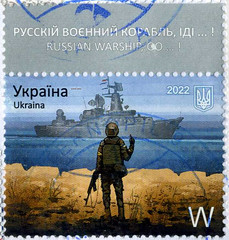 "The block of four 50 shagiv stamps are actually printed on stiff paper board and were used as small change for a short time. Both are neat items, but the block of four notes was mailed from Ukraine and was packed in something special. The envelope it came in has one of the
"The block of four 50 shagiv stamps are actually printed on stiff paper board and were used as small change for a short time. Both are neat items, but the block of four notes was mailed from Ukraine and was packed in something special. The envelope it came in has one of the Russian Warship, Go [self fornicate]!
stamps in a nice place of prominence, including a bit of the selvedge telling what the ship can do in Ukrainian and English.
"I have seen the unused stamps go for quite a bit of money and the first day covers are quite pricy now. I was very careful opening it and the cover is now proudly in my collection. There's apparently been a subsequent issue of that stamp but with a big DONE printed on it after the Moskva was sunk. I am not sure how many of these were postally used in a non-philatelic fashion, but I would imagine it's not a lot."
Discussion at my end of the table included shopping for Large Cents at the EAC show amid a confusing landscape of EAC grades and third-party grades, a world where every dealer can point to their favorite (and most favorable) list to claim their wares among the finest known.
Itay and I discussed the history of The E-Sylum and ad rates while a number of other interesting items were passed around the table.
News and Views from the Far End of the Table
[Tom Kays provided the commentary and images in this section. Thanks!]
Seated far down table from Wayne by the luck of the draw, Tom Kays captured the dinner crowd in mid pose as we anticipated digging into spicy Thai specialties. Aromas from Crispy Snapper, Pad Thai, and Curry dishes enticed us to hurry up reciting the Buddhist blessing If you knew what I know about the power of giving, you would not let a single meal pass without sharing it in some way.
Let us share with you some numismatic kabobs seen at this fabulous dinner.
Wayne Herndon's dinner guest was international currency dealer Itay Tal from Israel, who brought a 1945 Ten Pound Bearer Bond from Palestine, that would pay interest for twenty years as each coupon was clipped. Ten years of coupons were redeemed. Itay is seated third from the right, in front of Wayne Homren, your friendly E-Sylum editor.
Keeping with a Middle Eastern theme, Roger showed an uncirculated, Philadelphia Mint-made, Arabian American Oil Company (ARAMCO) one pound
gold disc, (but not minted for royalty payments to the Government of Saudi Arabia in exchange for oil, per Roger Burdette). These discs provided the equivalent of one British Sovereign's worth of gold. Many were later melted for bullion.
Tom brought his usual small case of unusual coins, arrayed in artifact fashion, each with a good story behind their presence in the case.
- Included from top, left were: 1760 Hibernian Half Penny of George II,
- 1640 Half Leeuwendaalder of Utrecht,
- 1807 Half Dollar from the United States,
- 1788 Massachusetts Copper (Ryder 8C),
Middle Row:
- 1688 Crown of James II,
- 1723 Brunswick – Luneburg – Celle (German State) Thaler of George I,
- 1739 Mexico Eight Reales of Philip V,
- 1821 Emergency 30 Sous of Palma de Mallorca,
Bottom Row:
- 1864 Silver Token of the Great (Sanitary) Fair in Philadelphia,
- 1909 Half Sovereign of Edward VII,
- 1876 Prussian 20 Marks of Kaiser Wilhelm (from WWII Army Air Corps Pilot Pack),
- 1915 Denmark 20 Marks of Christian X (from WWII Army Air Corps Pilot Pack),
- 1811 Two Reales of Santiago, Chile (Military Bust), and lastly,
-
1900 Half Sovereign of
Veiled
Victoria with its original Henry Chapman flip.
Question: Looking in The Copper Collector's Guide to the Identification of 2x2 Envelopes by Ralph Rucker with Del Bland, Henry Chapman's flips are illustrated with address No.1348 Pine Street, Philadelphia. Do any readers know when Henry Chapman's address was located at 333 S. 16th Street, Philadelphia, which helps date this 2x2 envelope and his acquisition of this half sovereign?
Of special interest is the 1821-dated, 30 Sous (Sueldos) Emergency silver coin of Spanish King Ferdinand VII, from the Bellver Castle, Palma de Mallorca, the capitol of the Kingdom of Majorca, a Spanish State located in the Balearic Islands on the Mediterranean Sea.
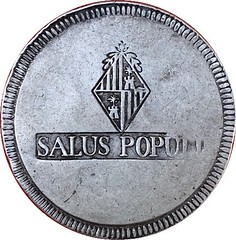 The reverse with coat of arms for Palma de Mallorca reads
The reverse with coat of arms for Palma de Mallorca reads Salus Populi
meaning Health to the People
in reference to a Yellow Fever epidemic that swept the island in the winter of 1821. The symptoms of Yellow Fever (spread by mosquitos) bears some resemblance to COVID-19 symptoms. These coins of civic necessity were made during the French occupation of the island. Coin blanks were made from melted silver taken from the island's churches and these coins were struck during 40 days in late November and December 1821.
The time has come and gone for sticky rice with mango ice cream, the check, and an end to all the storytelling for this evening at the Thai Luang in Herndon where they may say jur gan
meaning something like toodle loo.
Wrapping Up
I've never tried cataloging the clever restaurant restroom signage I've seen over the years, but these were among the cutest.
Clockwise from left: Chris Neuzil, Roger Burdette, Daryl Haynor, Wayne Herndon, Steve Bishop, Julian Leidman, Itay Tal, Mike Packard, Eric Schena and Tom Kays.
It was another enjoyable evening of numismatic fellowship. Luckily for me we wrapped up a little early and I wasn't so far from home, which left me time Tuesday evening to pack for my morning drive up to Pittsburgh for the Pennsylvania Association of Numismatists (PAN) show.
14TH CENTURY PURSE WITH FIVE GOLD COINS FOUND
The purse was not found complete of course, but the metal clasp was discovered and nearby were a number of coins. Here's the press release from Noonan's. -Editor
Married couple, Phil and Joan Castle, who live in New Romney in Kent have been metal detecting together for over 30 years. It was in October 2018, while searching one of their favourite ploughed fields at nearby Romney Marsh that Joan using her XP gold max found a broken gold coin on the surface, another signal beside it in the soil revealed a Medieval brass purse bar at eight inches down. Phil came over to help and immediately found a gold coin. Over the next two hours four more gold coins were uncovered in an area of five metres, with Joan finding two herself.
EIGHT REALES: THE FIRST INTERNATIONAL CURRENCY
This article on the long history and influence of the Spanish dollars was published by Hussein Larreal at coleccionistasdemonedas.com (in Spanish), and in English on the American Numismatic Association site. Here's an excerpt - see the complete article online for more. -Editor
More than a currency, the "Spanish dollars" were the basis of American national currencies: the multiple Latin "pesos" and the US "dollar" are successors of a Spanish currency whose respect transcended the great differences between societies of its time.
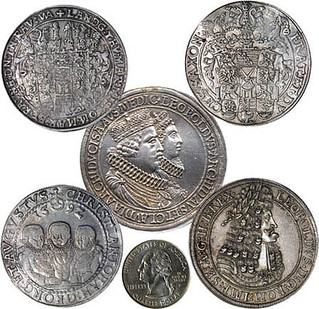 During the Modern Age, the Spanish Empire produced coins that ended up being used beyond its borders. They were the reals of eight: specimens that served for internal and international trade until after the Independence of the colonies. Below we will offer you some information about the origin, use and importance of these specimens, which symbolized Hispanic wealth, reach and influence on the five continents.
During the Modern Age, the Spanish Empire produced coins that ended up being used beyond its borders. They were the reals of eight: specimens that served for internal and international trade until after the Independence of the colonies. Below we will offer you some information about the origin, use and importance of these specimens, which symbolized Hispanic wealth, reach and influence on the five continents.
How the first reals of eight arose The reals of eight arise in a very particular way. On the one hand, in Austria, in 1486 Sigismund of Habsburg promoted the minting of large silver coins: the guldiner , weighing 31.93 grams and 937 thousandths of a law. These were not widely accepted at first, but served as inspiration for Bohemia to later produce the thaler , weighing 27 grams and 900 thousandths of a fine. These would be successful in Germanic lands, so Emperor Maximilian of Habsburg used them for propaganda purposes.
THE 1941 VICHY FRENCH 5 FRANCS
This Stack's Bowers blog article by Numismatist for World and Ancient Coins Nicholas Fritz highlights a scarce survivor of WWII - a 1941 Vichy French 5 Francs piece. -Editor
Almost everyone knows the story of the Fall of France, the collapse of French defenses and subsequent occupation by Germany during the Second World War. What some people do not realize is that not all of France was occupied by the Germans. As the German army advanced in the summer of 1940, the French government fled Paris. The military situation was dire, and the French government chose to seek an armistice with the Germans. Prime Minister Paul Reynaud resigned and Marshal Philippe Petain, hero of Verdun in the Great War, replaced him. Petain sought an armistice with Germany, and the Third French Republic was formally dissolved on the 10th of July with Petain given dictatorial powers over the successor state.
COMMEMORATIVE MARKET RISE AND FALL, PART 2
Here's the second part of Dave Bowers' series on the rise and fall of the commemorative coin market. -Editor
As I discussed in my last article, in the late 1980s classic silver commemorative coins became a focus of the coin market, especially as people saw them as investment products, attracted by low mintages and generally high grades. Investors flooded the market and prices kept increasing, attracting more and more attention. However, prices went so high that by 1988 most serious numismatists had dropped out. Few wanted to pay, say, $3,000 for a coin that a few years earlier could have been bought for $500 or even less. As investment-oriented coin circles have always done, in 1990 the market ran out of new faces. Few new investors appeared. Those who had poured large sums of money into commemoratives, without knowing what they were buying, sensed that the market was quiet. Time to sell! And so, the prices dropped, dropped and dropped some more!
LOUIS XIII GOLD MEDALLION
A unique gold medallion of Louis XIII is offered in the June 3-4 MDC Monaco auction. Here's a standalone article I excerpted from the press release. An amazing piece of work. See the earlier article for more information on the sale. -Editor
Lot 458.
Louis XIII (1610-1643). Gold medallion or artistic medal, Louis XIII and Marie de' Medici, assigned to Guillaume
Dupré, no date (1620-1622), Paris.
Obv. Bust of Louis XIII facing right, cuirassed, draped, wearing a plumed parade helmet and laureated [as Mars], on a kind of finial.
Rev. Bust of Marie de' Medici faceving right, cuirassed, draped, wearing a plumed parade helmet [as Pallas-Athena or Minerva].
Maz.- - Rouyer cf. XXVII/1 = BnF Paris L.2562 (bronze) = RN, 1892, p.491-496 = coll. P. Rattier (Rollin et Feuardent, 13th -14th april 1891, n° 71) = coll. B. Fillon (Rollin et Feuardent, 20th-24th march 1882, n° 165) - RN, 1990, p.232-253 [L. Smolderen - à propos de Guillaume Dupré] ; Gold - 86,10 g - 46,2 x 57 mm - 12 h.
Very high quality cast, with high reliefs re-chiseled by the artist himself and polished fields. The obverse and reverse listels have been processed differently. Unique and, more than a medal, a true piece of art. Almost Uncirculated. Price: 150000 €
This exceptional medallion (term we prefer compared to medal) is an unedited gold cast. This medallion is only known in bronze by the unique example of the Cabinet des médailles of the BnF in Paris, composed of two bronze plaques united in a brass frame with a bail. This bronze medallion of 47 x 58 mm, was acquired during the sale of Paul Rattier's cabinet (Rollin et Feuardent, 13th-14th of april 1891, n°165) and was previously a part of Benjamin Fillon's collection (Rollin et Feuardent, 20th-24th of march 1882, n°165). This bronze cast was represented in the Fillon's collection sale catalogue [Rollin et Feuardent, 20th-24th of march 1882, n°165], in the Revue numismatique of 1892, p. 491-492 (etching) and also in Les médailleurs… by Natalis Rondot, pl. XXVII n°1.
According to Henri de la Tour, in the Revue numismatique of 1892, p. 491 to 496, the Cabinet des médailles bronze cast,
Italian inspired
, was made by a French or Italian artist and would have been created between 1618 and 1623 : Careful
comparisons with coins and medals leads us to the same conclusion : the effigy on this piece was surely not made before
the one visible on the 1618's pattern and, on the other hand, was not made after 1623, the king being beardless whereas,
starting from 1623, the moustache starts appearing on the king's portrait, clearly distinguishable on the good strikes of
Dupré's medal with Justice in reverse. We will point out that the physiognomy of Mari de' Medici does not fit with the
king's one, the queen being rejuvenated and idealized, not showing the puffy figure visible on the contemporary
portraits.
Our example, like the bronze cast of the Cabinet des médailles, can be linked to another medal dated 1603, with no signature and still not found, only known by an intaglio made by the famous engraver Sébastien Leclerc (1637-1714), author of Médailles sur les principaux évènements du règne de Louis le Grand. This intaglio represents the bust of Marie de' Medici facing left, wearing a helmet and cuirassed, with the legend A MIS ICI REMEDDE MDCIII (anagram of MARIE DE MEDICIS 1603) [S. Leclerc, Monnaies et médailles…, pl. VIII n°2]. On the same page, board VIII n°3, is our oval medallion representing Marie de' Medici.
Whereas Marie de' Medici's portrait might be idealized considering the age of the Queen-mother, we think that the king's one is pretty accurate. The beardless face combined with his early middle age representation leads us to think, like Henri de la Tour in the Revue numismatique of 1892, that the engraving of the royal portrait has been realized in the 1620's and certainly before 1623.
There are very few events justifying the representation of a warrior king and a Marie de' Medici depicted as Pallas Athena (or Minerva), goddess of wisdom, intelligence and military strategy, but also symbol of Regency. Our medallion has to be posterior to the Treaty of Angoulême (30th april 1619) ending conflict between Louis XIII and his mother, consolidated on the 5th of september 1619 by the public reconciliation of Tours. On the 24th of December 1620, Protestants decide to take up arms after the La Rochelle's assembly. From 1620 to 1622, a military operation is carried out against Protestants of La Rochelle. Our medallion could symbolize the common policy adopted by the Queen-mother and her son to face the beginnings of the protestant revolt of La Rochelle ? Louis XIII, as the war chief, and Marie de' Medici, as Pallas-Athena or Minerva, goddess of wisdom and military strategy, could show the unity between the King and the Queen-mother facing the protestant threat and fighting it together.
The artist of our unsigned medallion is unknown. Some careful comparisons with Italian medals of the second half of
the XVIIth century made by Henri de la Tour in the Revue numismatique of 1892, p.495, demonstrate a clear transalpine
influence. Rouyer quotes de la Tour in a comment about a medallion belonging to Jacob Richier and says Fillon
attributed it to a Frenchman, but was surprised that such an engraver could have stayed unknown. M. Henri de la Tour,
without saying anything about the nationality of the author, thinks that it is –absolutely Italian inspired-
. Some elements
allow us to name Guillaume Dupré as the author of the medallion : his travel in Italy in 1612, which has
singularly
confirmed the Italianate and decorative tendencies of his style
(Smolderen, Revue numismatique 1990, p. 231), his
close relations with Rubens, author of some paneling from the Cycle of Marie de' Medici (1622-1625) in which the
portrait of Marie de' Medici as a triumphant queen links the two artists. But it's mostly the engraving quality, the finish
of the casting of which he was a renowned specialist and the high reliefs that lead us to Guillaume Dupré as the author.
Note that Guillaume Dupré was a Huguenot and, as Smolderen writes : It is allowed to ask ourselves if the Huguenot
Guillaume Dupré could have agree to celebrate such actions against other Protestants.
However, that could explain
why our medallion is unsigned.
Guillaume (1576-1643) is a sculptor since 1597, trained by his father-in-law Barthélémy Prieur. He becomes first
King's sculptor in June 1611, general controller of French coins' hallmarks and effigies in October 1601 jointly with
Jean Pillon, then alone in 1617. He is also general commissioner of artillery around 1629. His work is essentially
composed of portraits ; some of his medals are uniface. He is a fantastic portraitist with a taste for opulent reliefs. Despite
the event it seems to be connected with, our medallion is more than a medal, it is a piece of art worthy of the greatest
artists of his time. Let's quote Rouyer one more time : [this piece] is beautiful, made with finesse by a self-assured
hand ; it is more of a jewel than a medal.
Consulted works :
RONDOT (N.).- Les médailleurs et les graveurs de monnaies, jetons et médailles en France.- Paris : E. Leroux, 1904.
LA TOUR (H. DE).- Médailles modernes récemment acquises par le Cabinet de France. VI/. Louis XIII et Marie de Médicis.- Revue numismatique.- 1892.- p. 491-496, fig.
JOMBERT (Ch.-Ant.).- Catalogue raisonné de l'œuvre de Sébastien Leclerc. Partie 1.- Paris : l'Auteur, 1774.
LECLERC (S.).- Monnaies et médailles relatives à l'histoire de France, de Charles VII à Louis XIII.- Miscellany of XI boards, XVIIth siècle.
SMOLDEREN (L.).- À propos de Guillaume Dupré.- Revue numismatique.- 1990.- p. 232-253, pl. ee
MAZEROLLE (F.).- Les médailleurs français, du XV siècle au milieu du XVII .- 3 volumes.- Paris : Imprimerie nationale, 1902-1904.
To read the earlier E-Sylum article, see:
MDC MONACO JUNE 2022 AUCTION
(https://www.coinbooks.org/v25/esylum_v25n20a17.html)
MORE ON THE ZELENSKY MEDAL
Dave Lange purchased one of the new Zelensky medals and has these comments. -Editor
KENTUCKY DERBY CENTENNIAL MEDAL
On May 12, 2022 Kentucky Colonel Dennis Tucker published a nice post-race article about a Marcel Jovine-designed medal for the 100th anniversary of the Kentucky Derby. -Editor
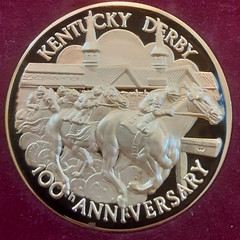 Last week's Kentucky Derby win by Rich Strike was one of the biggest upsets in the famous race's nearly 150-year history. The chestnut colt wasn't even scheduled to compete in this year's
Last week's Kentucky Derby win by Rich Strike was one of the biggest upsets in the famous race's nearly 150-year history. The chestnut colt wasn't even scheduled to compete in this year's Fastest Two Minutes in Sports
until just before the deadline, when Ethereal Road was scratched from the lineup.
If you're the betting type, a $50 wager on long-shot Rich Strike would have yielded a payoff of $4,090—more than enough winnings to build yourself a very nice display of Kentucky Derby medals and other collectibles.
One such medal is this week's featured collectible From the Colonel's Desk.
DID SAN FRANCISCO BUY NORTON A NEW SUIT?
Bibliophiles and researchers are quite familiar with how conjecture, speculation and outright lies gradually morph into "facts" accepted by future generations. In a recent article, John Lumea of the Emperor Norton Trust examines how an often repeated claim about Norton's suit may have had its origins in a 1927 booklet. Here's an excerpt. -Editor
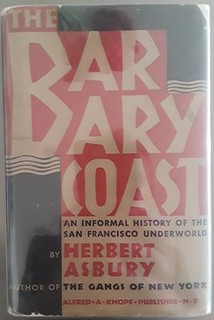 For nearly a century, those carrying forward Emperor Norton's story — not all, but enough to make it stick — have included amongst their readily accepted and blithely repeated
For nearly a century, those carrying forward Emperor Norton's story — not all, but enough to make it stick — have included amongst their readily accepted and blithely repeated greatest hits
the claim that, when the Emperor's uniform became tattered, the San Francisco Board of Supervisors, the City's elected government, bought him a new one.
If such a momentous thing had taken place, one would expect to see it contemporaneously documented in local newspapers of the day or in the official Municipal Reports of the City and County of San Francisco.
THE BOOK BAZARRE
THRIFT SHOP PALESTINE BANKNOTE FIND
Justin Perrault passed along this story about a thrift shop paper money find. Thanks. Great story. -Editor
A rare £100 ($122) bank note found in a charity shop has sold for £140,000 ($171,724).
Oxfam volunteer Paul Wyman was working in the Brentwood branch in Essex, England when he spotted an unusual bank note in a box of donated items.
The £100 Palestine pounds is one of less than ten known to exist and was issued to high ranking officials during the time of the British Mandate in Palestine in 1927.
THE ROYAL CANADIAN MINT'S "ULTIMATE" COIN
A.J. Behul submitted this article about the Royal Canadian Mint's new "Ultimate" coin. Thanks. -Editor
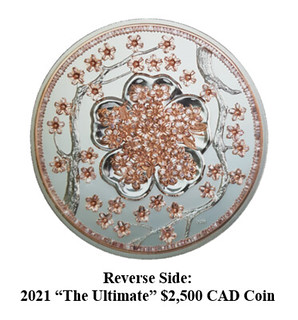
The Ultimate
Coin?
Written by A.J. Behul
As a matter of fact, yes...and its name says it all.
The Ultimate
is the Royal Canadian Mint's very first one-kilogram pure platinum coin, adorned with hundreds of rare pink diamonds from the renowned Argyle diamond mine, in the remote north of Western Australia.
The magnificent specimen was on display for two-days at Heffel Toronto, located on Hazelton Avenue.
ROYAL MINT LAUNCHES LUXURY JEWELLERY LINE
Apparently this is a real trend - across the Atlantic The Royal Mint has also branched out into making jewellery. Here's an excerpt from an Elle magazine article. See the links before for the original press release. -Editor
If The Royal Mint conjures up visions of army medals, gigantic old-fashioned machines, piles and piles of glittering coins and school trips to the Tower of London, think again – for the world's leading export mint and Britain's oldest brand has now ventured into the luxury lifestyle sector, and there's a lot to get excited about.
LOOSE CHANGE: MAY 22, 2022
Here are some additional items in the media this week that may be of interest. -Editor
I enjoyed this short post on the Coin Talk chat board. -Editor
Domitian
Æ Semis, 2.90g
Rome mint, 90-91 AD
Obv: IMP DOMIT AVG GERM COS XV; Bust of Apollo, draped, r.; in front, branch
Rev: S C in exergue; Raven stg. r. on laurel branch
RIC 710 (C). BMC 453. BNC 484.
Acquired from Den of Antiquity, May 2022.
Domitian's smaller bronzes rarely feature a portrait of the emperor. This semis from 90-91 sports a bust of Apollo on the obverse and, appropriately enough, his divine messenger a raven on the reverse. Perhaps an allusion to Domitian's support of the arts.
To read the complete article, see:
A Coin Edgar Allan Poe Could Love
(https://www.cointalk.com/threads/a-coin-edgar-allan-poe-could-love.396696/)
Other topics this week include Cromwell shilling pub renovstion find, Mint Master Reiner Budel, and an antiquities bust in Israel. -Editor
FEATURED WEB SITE: ROYAL NUMISMATIC SOCIETY
This week's Featured Web Site is the Royal Numismatic Society.
The Royal Numismatic Society is the UK's foremost society for numismatics – the study of coins, medals and related currency items. Founded in 1836 as The Numismatic Society of London, today's Society is international in subject and membership. Its lectures and publications deal with Classical, Asian, Medieval and Modern coins, paper money, tokens and medals. Fellows include scholars and enthusiasts from around the world.
The Society exists to support the study of numismatics and to promote scholarship on any subject related to numismatics. This includes running regular Meetings, which are open to all and include talks by senior figures in numismatic research as well as younger scholars.
The RNS produces a variety of publications on a range of numismatic subjects, including The Numismatic Chronicle, one of the most prestigious international venues for English-language publication on the subject.
In May 1904 the society obtained its Royal Charter. To celebrate the event, a dinner was given by the president J. Evans to the Council at the Holborn Restaurant in central London.

